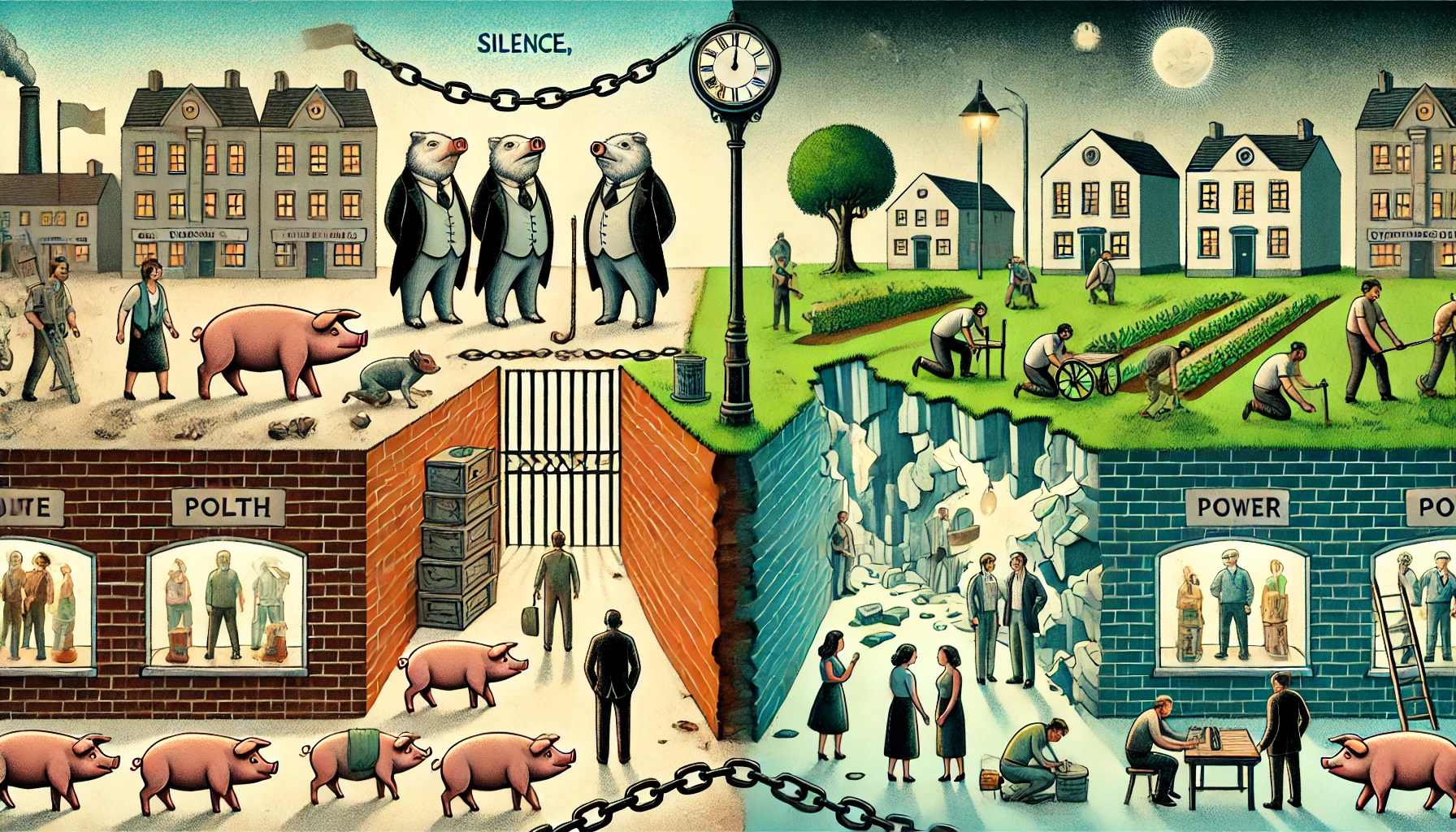Silence, power, and missed opportunities: Why leadership fails to build flourishing cities and businesses
In George Orwell’s Animal Farm, the animals revolt with high hopes of equality and shared prosperity. Yet, as the pigs accumulate power, they become the very tyrants they once overthrew. The animals—lacking the will or courage to hold their leaders accountable—accept the gradual erosion of their freedoms, believing “it’s just the way things are.” This story offers more than just a political allegory; it speaks to the ways communities, especially smaller cities and towns, can fall into patterns of complacency, silence, and resistance to change.
In many smaller towns, there is often a reluctance to openly question leadership or critically debate the changes needed for growth. While some cities excel at fostering public discourse, others allow poor decisions to persist, stifling opportunities for progress. This article explores how leadership can go astray when public accountability is weak, fear of change dominates, and evidence is ignored. Drawing on literature, music, and real-world examples, it argues that flourishing communities and businesses require both bold leaders and engaged citizens willing to challenge the status quo.
Silence and Complacency: A Recipe for Stagnation
One of the most striking aspects of Animal Farm is the ease with which the animals accept their worsening conditions. As the pigs rewrite the rules, the other animals grumble but rarely challenge them. Over time, they internalise the narrative that the pigs’ leadership is essential for survival. This dynamic plays out in many small cities and towns, where the desire to avoid conflict or embarrassment discourages people from holding leaders accountable.
Communities with low civic engagement tend to develop cultures of complacency. In such environments, leaders—whether in government or business—are rarely challenged on their decisions, even when evidence suggests the need for change. Public meetings may be poorly attended, and citizens often accept flawed policies as unavoidable. In contrast, cities like Amsterdam foster public accountability through transparent governance, community consultation, and citizen involvement in planning decisions. These practices lead to better outcomes, as people feel empowered to shape their communities.
Bob Dylan’s song “Blowin’ in the Wind” reflects the frustration of those seeking answers to injustices while their pleas go unanswered. It captures the sense of futility that can pervade towns where citizens feel their voices don’t matter. Leaders in such places often fall into complacency, making decisions without fear of scrutiny or meaningful debate, which stifles growth and innovation.
Fear of Change and the Comfort of the Familiar
Another theme in Animal Farm is the animals’ fear of returning to the chaos that existed before the revolution. This fear keeps them loyal to Napoleon’s oppressive regime, even when it no longer serves their interests. In real-world small towns, fear of change often manifests in resistance to new ideas, policies, and industries. Leaders may choose to preserve familiar ways of doing things—even when evidence shows that innovation is essential for future prosperity.
In many regional towns, loyalty to long-standing industries such as agriculture or manufacturing can inhibit the development of new sectors. While larger cities like Melbourne and Sydney have embraced the creative economy, digital innovation, and sustainability, smaller towns often resist these shifts. This reluctance stems from a desire to protect local identity and avoid the discomfort of transformation.
In The Great Gatsby, F. Scott Fitzgerald explores the allure of the past, with Gatsby clinging to an idealised version of his former life. Similarly, towns that obsess over preserving “how things have always been” risk missing out on new opportunities. Cities like Portland, Oregon, show how smaller communities can thrive by embracing change—investing in green spaces, startups, and creative industries that attract young talent and foster growth.
The Echo Chamber of Power: Leaders Who Surround Themselves with Silence
In Animal Farm, Napoleon surrounds himself with loyal followers who reinforce his authority. Dissent is crushed, and critical debate is absent, leading to increasingly destructive decisions. This pattern is familiar in many small communities, where leaders operate within echo chambers—surrounded by allies who tell them what they want to hear rather than what they need to know.
Leaders in small cities and towns often prefer the comfort of agreement over the challenge of criticism. When boards, councils, or advisory groups consist only of insiders with similar views, it becomes difficult to introduce new ideas or address emerging challenges. Harvard Business Review has shown that diverse teams make better decisions, but this diversity is often missing in leadership circles within smaller communities.
In Lord of the Flies by William Golding, the boys stranded on the island fall into chaos because they ignore constructive feedback and become consumed by power struggles. Similarly, leaders who avoid open debate and dismiss alternative viewpoints undermine their community’s potential for growth. This pattern leads to short-term decisions that may placate insiders but leave towns unprepared for future challenges.
Public Accountability and the Power of Debate
Some cities understand the importance of public accountability and foster a culture of debate and engagement. Barcelona, for example, transformed itself into a thriving global city by involving citizens in urban planning and embracing bold reforms. These changes were not easy or universally popular, but they reflected the city’s commitment to progress through transparency and public participation.
In contrast, towns without a culture of critical debate tend to fall behind. Leaders may avoid making difficult decisions—such as investing in new technologies or rethinking outdated infrastructure—because they fear backlash or confrontation. Yet avoiding hard conversations only delays the inevitable and makes future challenges more difficult to address.
Leonard Cohen’s song “Anthem” offers a powerful reminder that “there is a crack in everything—that’s how the light gets in.” This metaphor speaks to the value of open dialogue, even when it is uncomfortable. Flourishing cities and businesses embrace the cracks—allowing new ideas and solutions to emerge through debate and experimentation.
Short-Term Wins, Long-Term Costs
In both business and government, there is a temptation to prioritise short-term wins over long-term growth. In Animal Farm, the pigs focus on maintaining control rather than building a sustainable future for the animals. Similarly, leaders in small towns may implement policies that provide immediate relief but fail to address deeper issues.
This short-term thinking is common in economic strategies that favour outdated industries or quick political gains. For example, investing in large, one-off events may boost tourism temporarily, but without long-term planning, such strategies often leave communities without sustainable growth. In contrast, cities like Austin, Texas, have focused on building ecosystems for tech startups and creative industries, resulting in sustained economic growth.
The TV series The Bear captures the tension between short-term firefighting and long-term vision. The protagonist, a chef, struggles to transform a failing restaurant, realising that meaningful change requires patience and strategic thinking. Similarly, leaders in small towns and businesses must resist the pressure to deliver quick results at the expense of future prosperity.
Bold Leadership and Engaged Communities: The Key to Flourishing
Flourishing cities and businesses are not built by leaders alone; they require the active engagement of citizens and stakeholders. Leadership must be both visionary and inclusive—willing to listen to evidence, challenge assumptions, and foster open dialogue. Citizens, in turn, must hold their leaders accountable, demanding transparency and participation in decision-making processes.
The most successful communities embrace change even when it is uncomfortable. They invest in innovation, diversity, and long-term planning, understanding that progress often involves taking risks. In 1984, Orwell warns of the dangers of a society that silences dissent and controls information. Flourishing cities, by contrast, thrive on open exchange—welcoming ideas and solutions from all corners.
The choice for small towns and businesses is clear: embrace evidence, engage in honest debate, and plan for the future—or cling to the past and risk being left behind. As Dylan’s lyrics remind us, “The times they are a-changin’.” Leaders and communities alike must decide whether to move with the times or be swept aside by them.




